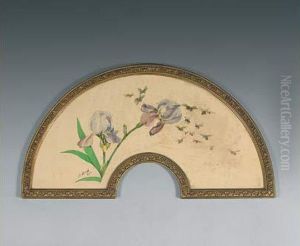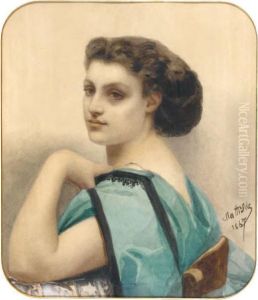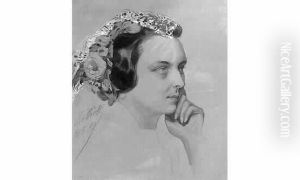Mathilde, Princesse Bonaparte Paintings
Mathilde, Princesse Bonaparte, born Mathilde Laetitia Wilhelmine Bonaparte on May 27, 1820, in Trieste, was a notable figure in the Bonaparte family, being a niece of Napoleon Bonaparte. Her father was Jérôme Bonaparte, Napoleon's youngest brother, who was King of Westphalia, and her mother was Catharina of Württemberg. Despite the fall of the Napoleonic Empire in 1815, Mathilde's family retained a significant status and wealth, which allowed her to lead a life of considerable influence and luxury.
Mathilde's early life was marked by the political upheavals and restorations that followed the Napoleonic era. Her family's fortunes were significantly affected by these changes, leading them to live in Rome and then Florence. In 1840, she married Anatole Demidov, a Russian industrialist and aristocrat, under the condition that she retain the Bonaparte name and precedence. The marriage, however, was unhappy and eventually led to separation, though not official divorce due to the laws and the influence of the Catholic Church at the time.
Princesse Mathilde became a central figure in the social and cultural life of Paris, especially during the Second Empire, under the rule of her cousin, Emperor Napoleon III. She was known for her intelligence, wit, and beauty, and her salon in Paris became a gathering place for intellectuals, artists, and politicians of the day. Her support of the arts and letters made her salon one of the most influential in European society. She was a patron to many artists and writers, including Gustave Flaubert and Charles Gounod.
Despite her royal connections, Mathilde's life was not without controversy and challenges. Her relationship with her husband, her outspoken nature, and her independent lifestyle often made her the subject of gossip and scandal in the conservative circles of the time. However, her status and personality allowed her to navigate these issues with a degree of freedom that was unusual for women of her era.
After the fall of the Second Empire in 1870, Mathilde continued to play an active role in French society, although with somewhat diminished influence. She remained a respected and influential figure until her death on January 2, 1904, in Paris. Through her patronage and her salon, Princesse Mathilde left a lasting impact on the cultural and social fabric of 19th-century France. Her legacy is remembered for the pivotal role she played in promoting the arts and fostering intellectual discourse during a vibrant period of French history.






